Dear Horace
A letter to an English man who died in Karatsu 65 years ago.
| |
Dear Horace,
When you died in Karatsu in 1950, I was a 6-year-old child, and I did not
live here at that time.
So, I had no idea what kind of person you were. But now, 65 years after
your death, why am I so much attached to you, and want to know about you
so eagerly?
I will write an epitaph here for you, because you have lost your grave
in the pine forest.
This is a story of your life, and it tells us something important about
.......nationhood, war...........and love.
|
| |
Prologue
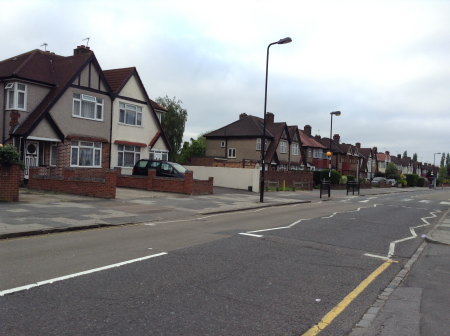 |
| Street of Greenford |
On June 27, 2013, my husband and I got off the train at the Greenford Station, west of London. It was early morning, since not to lose time from our short stay in London, we had to leave the hotel very early. We had a simple breakfast at a small bakers, and got some information.
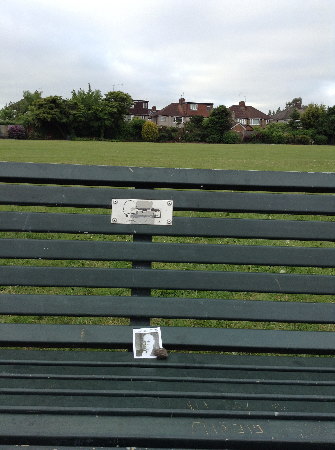 |
| Photo on the bench |
The place was found easily. It was a vast vacant lot, rather than a park.
An old man walking there told us that this place had long been the center
of the community, markets and parties being held here.
Time was limited. We would not be able to find the house where you
were born in 1870. But this park! You must have come here often with your
family and had fun together with parish people.
I took out the small copy of your photo from my bag, and put it on the
bench in the center of the park. Winds were blowing. I put a small stone
on it.
"Dear Horace, you are back home to Greenford. Have a nice day with
your family!"
Then we left and got back to London.
Chapter 1 The Grave in the pine forest
There is a cemetery in the pine forest near our house. Our family's
graveyard is there, and each time I go, I pass by a grave on which some
English words were carved. For more than 40 years, I paid no special attention
to it. But one day in January 2013, I had a strange sudden curiosity to
the grave. I stepped up 5 stone stairs and had a closer look.
Hum....... Who is this? I read it, and the epitaph struck me.
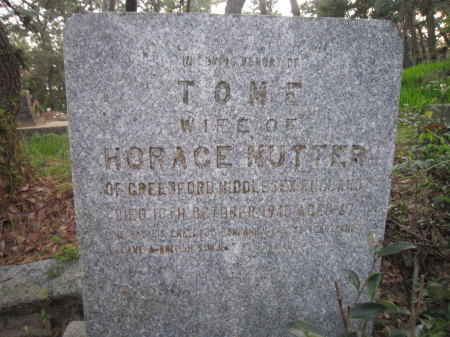 |
IN LOVING MEMORY OF
T O M E
W I F E O F
HORACE NUTTER
OF GREENFORD MIDDLESEX ENGLAND
DIED 18TH OCTOBER 1945 AGED 67
SHE WAS HIS CHEERFUL COMPANION FOR 43 YEARS AND
BECAME A BRITISH SUBJECT BY MARRIAGE
(This is the upper half of the stone, and on the lower half ,
Tome's Kaimyo is carved in Japanese,
telling this grave was built by Horace Nutter in 1947)
|
Japanese epitaphs are usually only names of the individual or the
family. But this grave has these words. Tome died in October of 1945, which
is 2 months after the end of the Pacific War. This grave was built two
years later. I was especially surprised at four words. "British",
"cheerful", "companion" and "marriage".
Why?
First, "British": During the World War 2, America and England
were the two main enemies against Japan. Before and during the war, Americans
and Englishmen were arrested if they did not leave Japan early enough.
If not arrested, they were strictly watched by military police. Only two
years after war, Horace Nutter proudly said that his wife "became
a "British" Subject by marriage". England won, so it would
be safe to say so now. Dear Horace, I can feel what you meant by this.
During the war, you must have just endured everything. Now only after Tome's
death, you could say "British", but too late.
The next words are "companion" and "marriage":
Dear Horace, you said Tome was a cheerful companion for 43 years. According
to the length of matrimony, you got married in a late year of the Meiji
Era, probably in 1902. At that time, feudalism still lingered in Japan,
and the relationship between husband and wife was not equal. Women were
in subordination to men. Wives could never be "companions". They
were possessions of husbands.
Also, at that time, in the Meiji Era, legal international marriage
was very rare. Numerous foreign merchants came into Japan when the door
was opened 300 years after "Sakoku" of the Edo Era. These young
businessmen married Japanese wives who were mostly Geisha girls. These
girls did not want to be a legal, permanent wife to an "Ijin-san"(different
people) renouncing Japanese nationality. Even the famous merchant Thomas
Glover, who came to Nagasaki at the last days of Edo Era and became instantly
a millionaire by selling weapons to both sides of Meiji Restoration enemies,
did not have a legal wife.
But, Horace, you married Tome legally, and paid a lot of respect to your
wife. That is a rare case, I suppose.
And the last surprise is "cheerful".
Before the World War of Showa, Japanese women's virtue was silence, obedience,
and patience (now it is not!). If a girl was naturally cheerful, she tried
not to look so. I guess, dear Horace, you mean "Tome cheered, encouraged
and supported you in your difficult days living in an enemy country."
Am I right?
My heart was grabbed, and all of a sudden I fell in love with you.
I asked my husband,"Do you know Horace and Tome Nutter?"
"I've heard about Nata-san long time ago. Maybe he died some years
after the war. When I was a child he still lived on Ten-ten-yama, and his
house is still there. We called the house "Ijin-Yashiki (meaning foreigner's
house).
"Did you know Tome-san who died in 1945?"
"I don't remember. The only thing I remember is that children were
told not to go close to the house, because it is dangerous."
"Dangerous? How?"
"I don't know. Rumor said Nata-san was a spy of England."
Horace, I know you were not. A spy would not leave this kind of epitaph
for his wife.
Chapter 2 The Ijin-Yashiki on Ten-ten-yama
I went to Ten-ten-yama. It is very close to our house, only 4 minute's walk away. It is not a "Yama (mountain) at all. It is probably 10 meters above sea level, a little higher than the land around it.
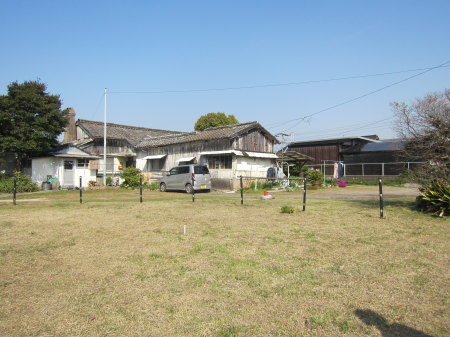 |
| The Ijin-Yashiki on Ten-ten-yama |
I saw the old house. A friend of mine, an architect who knows much about
the old buildings accompanied me. He said this old house is not a genuine
western style, but the carpenter did his best to make it look western.
It has a mantle piece round the fireplace. We could see the remains of
red paint on black Japanese roof tiles, and wooden walls were probably
colored mint-green. The house must have looked completely different from
usual Japanese houses. For over 100 years this house has been here.
I met the person who lives here. They have lived in this house for
almost 60 years by renting. The owner is an old lady, but she was not Horace's
family.
Now most of the Ten-ten-yama land is vacant, and an old big tree
is looking down the Ijin-yashiki silently.
I investigated about the house, and what I found was this.
The oldest records are not available now, but the early Showa record tells this house was originally registered under the name of "Tome Nutter of Greenford, England", not telling when. It is not strange, because in Japan, registration of real estate has not a long history. After Tome's death, the property was inherited by Horace, then after his death, by his brother and sister in England, and next, a Japanese man bought it and now this man's daughter is the owner of the house.
Chapter 3 The Search
Dear Horace,
After I saw your wife's grave and your old house, I could not help starting
the search. I could not resist my curiosity about you. How did you look?
Was Tome beautiful? Did you have difficult days during and after the war?
How sorrowful you must be when Tome left you forever. What did you do before
the war? What made you come to Japan? Why did you not go back to England
when the war started? Because of Tome? Why didn't you take her to England?
That's also because of Tome?
Dear Horace,
My search continued for 6 months. Hearing from the people around
Ten-ten-yama, including my husband's brothers and sister. What I knew is
that this house was a country house of Horace and Tome. You did not live
here before the war. Only once in a while you came back for holidays. A
hint showed that you were doing trade at Moji, in Kitakyushu, so my search
was extended to Moji, and also to England.
 |
| David MacLennan |
Dear Horace, it is my great pleasure to introduce you a friend, David
MacLennan, an Englishman who now lives in Tasmania. He kindly took over
the research in England. David was an amazing detective. He found out many
details. Thanks to David, I could get a rough idea of what kind of person
you were.
So, I will write here what I found from the search in Karatsu, in
England, and in Moji. It is tracing the course of your life. There must
be some missing links, of course. But you know, I have imagination to fill
in the blanks.
Chapter 4 The life of Horace Nutter
David's search was astonishing. Dear Horace, we now know that you
were born in 1870 in Greenford.
According to the household record of 1871 census, you were 0 year-old (probably
10-11 months), your father was Elliot S Nutter (38), and your mother, Mary
A Nutter(35). The address is Northolt
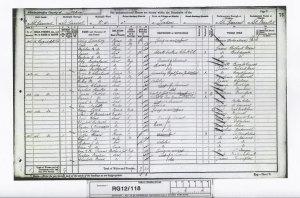 |
| Old records David found |
Road Stanhope Villas. Parish is Greenford Magna, and District is Brentford,
Acton.
Your father's occupation was not written. You had a sister Katherine (7),
and brother Philip (2).
1881 census tells us that you were 10, and had two more family members.
Younger brother Francis and younger sister Louise. 7 members of Nutter
family! How happy you must have been in Greenford!
According to 1891 census, we could know that you and Francis were
in London. You were 20 years old then, and living at Pancras, London where
you were working as a clerk of a SHIPPING and INSURANCE company!
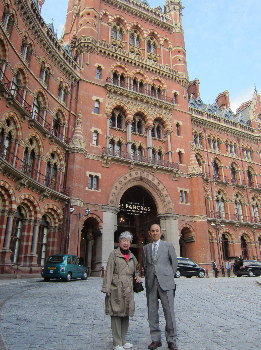 |
| We stayed one night at Pancras Station Hotel. Did you go to your company from here? |
Dear Horace, my imagination tells me that your shipping company sent you
to Japan.
It must have been before 1901, because David could not trace you in that
year's census. You were not yet 30 years old when you came to Japan, just
like other western merchants at the time. Young boys were sent to Japan
because those companies were not yet sure if Japan was a safe country for
foreigners.
During my research in Moji, I was lucky to find a book, a kind of
Who's who, published in Moji in Showa 5 (1930). There was a mention of
Horace Nutter, with a portrait. According to the article, you came to Moji
around 1900 after some years in USA, then Kobe and Nagasaki. You were in
charge of the Moji
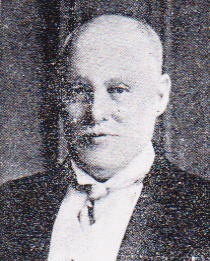 |
| Horace Nutter at age 60 (1930) |
Branch of "Brown & Co." But after 1911, you had your own
company Nutter & Co. and it went very well. Your company was a well
known trading company in the prosperous Moji international port. You are
an intelligent English gentleman, a graduate from the University of London,
your hobbies are reading and gardening, and you are editing an English-Japanese
dictionary in alphabets.
You have long worked as an honorary council of Portugal. Your wife Tome
is a daughter of a samurai family of the Karatsu clan, and you and Tome
have one daughter.
The above is the information I got from the book. It was a great luck. When the book was published, you were 60 years old. You look so gentle, slightly smiling, your eyes, of which color I cannot tell from the black-and-white portrait, are also gentle.
As for you before this book's publishing year, I got some more information.
A newspaper article of 1908 tells that "a Horace Nutter leased a
large plot of land in Karatsu for 1000years at the price of 500yen".
The newspaper was criticizing it. At that time, foreigners could not register
real estate. So Horace leased it. For 1000years! This is the method that
the famous Thomas Glover did in Nagasaki 30 years before. On the land Horace
leased, the Karatsu Branch of Brown & Co. built an office and a factory
to make wooden boxes for containing fish.
I have a friend who cooperated in the search about the coal
mining related matters. He found an
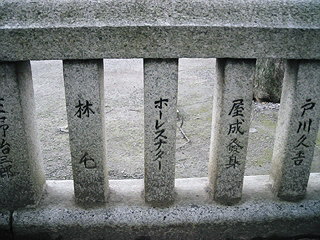 |
| At Gosho-jinjya in Moji. The center is Horace's name. |
advertisement in a newspaper in 1912. Horace Nutter & Co. was a monopolizing
agency to sell "Safe Mining Lamps" imported from England to all
the coalmining companies in Kyushu. You must have become very rich, exporting
coal and importing mining tools. At that time, coal was called "black
diamond". The coal business made a big fortune.
You donated money to shrines in Moji and Karatsu. In Moji, at Gosho-jinjya
Shrine, your name is carved to express thanks. In Karatsu, the village
history book has a record of Horace and Tome's donation. I can tell that
you and Tome were good persons and loved your towns very much.
Then, the war started in 1941 with Japan' attack on Pearl Harbor.
Dear Horace, how sad and disappointed you must have been. Your country
and Japan were now enemies. Your fortune was frozen, your company and house
were taken and you could not go out freely. I don't know why you were not
arrested. Maybe because your wife was a Japanese. You had helped Japan
to make a big progress in industry. But Japan paid you back with hostility.
The Pacific War ended in Japan's unconditional surrender on August
15th, 1945, after two atomic bombs in Hiroshima and Nagasaki. Only 11 days
later, Tomisaburo Glover, Thomas's son, hanged himself at his house in
Nagasaki. His wife Waka had died 2 years before. Tomisaburo was watched
by
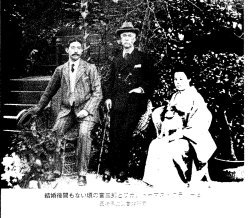 |
| From left; Tomisaburo, Thomas, Tomisaburo's wife |
Japan's military police during the war. His father and himself were persons who did their best to help Japan. But they became enemies to Japan during the war.
Tomisaburo was one year senior to you, Horace. You must have known
him, because before Moji, you were at Nagasaki, and at that time, for foreign
merchants, "Nagasaki" meant "Thomas Glover and his son Tomisaburo
Glover".
And only two months after Tomisaburo Glover's death, you lost Tome. It
is so painful to imagine how you felt.
In that winter of 1945, was your fireplace warm enough to soothe
your pain?
Dear Horace, two years after Tome's death, you built a grave in the
pine forest for her.
After that what happened to you? Did you go somewhere?
I searched for a hint asking many temples in Karatsu. Japanese
temples have records about people's death. In Japan, mostly all the families
belong to a temple. When someone dies, the priest of the temple does the
funeral ritual and gives a new Buddhism name "Kaimyo" to the deceased person. Each death is recorded in a book named "Kako-cho
= Past note". Kaimyo's Chinese characters are carefully selected by
the priest, often expressing the dead person's personality, deed, or looks.
Finally I found out the temple which did Tome's funeral and
gave her the Kaimyo. Tome's Kaimyo has Chinese characters meaning Gem and
Look, which tells she was a real beauty. It has two other letters which
mean Fidelity and Green! What a beautiful Kaimyo! People around Ten-ten-yama
who witnessed Tome said she was very beautiful.
And in the same Kakocho, I could find Horace's funeral record of
5 years later. You also were given Japanese Buddhism name. "Strong-built,
Gold, Wave" You died on September 5, 1950. Your ashes were buried
in Tome's Grave in the pine forest. But nobody carved an epitaph for you,
Horace. Only the temple record knows that you sleep now together with Tome
in the pine forest.
Chapter 5 Two mysteries
While I was investigating your life, I encountered two mysteries.
First; University of London.
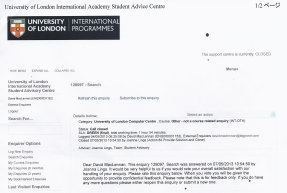 |
| Answer to David from University of London |
David asked to the University, and could not find any record of our Horace
Nutter, while there were two other identical names of much different birth
years. At the year of twenty, as I wrote before, you were working as a
clerk for a shipping company in London. The great merchant Thomas Glover,
also, did not go to university. Probably you needed some academic history
before Japanese people who respected you so much.
Second: The Who's Who published in Moji in 1930, as I mentioned, says that
you have a daughter.
But people around Ten-ten-yama never witnessed your daughter. Where was
she gone? Got married? Went to England by herself?
At your death, dear Horace, your property of Ten-ten-yama was inherited
to your brother and sister. That means you had no children at the time
of your death. Did your daughter die before you?
If so, what a pity! You lived a painful life at the last stage.
Epilogue
In August, 2013, (that is 2 months after our visit to London, ) I
went to the grave. To my astonishment, the grave had disappeared. I was
shocked, and felt sad. At the same time, suddenly I understood.
Dear Horace, now I know the reason why you appeared to me 6 months before, and made me search about you so hurriedly. You wanted me to take you back to Greenford, didn't you? You knew that your grave would soon be removed.
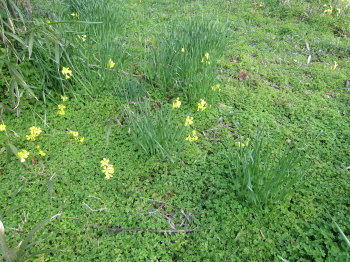 |
| Spring flowers on Ten-ten-yama |
Each time I go to our family grave, I look carefully if there is any sign
of re-building of your grave.
Twenty months have passed. There is no sign. Poor Horace, you have lost
it forever.
I wrote this letter to you, here on my web site, as an epitaph for
an Englishman who loved a Japanese woman and died a lonely death 65 years
ago. May you be with your wife back in Greenford, as British Subjects.
May your spirit be calm and soothed. May you forgive us Japanese who did
unreasonable things to you.
My dear Horace, I believe you are happy now with your cheerful companion in your beautiful home town, Greenford.
Special thanks to Mr. David MacLennan for his research and proof reading.
|
|